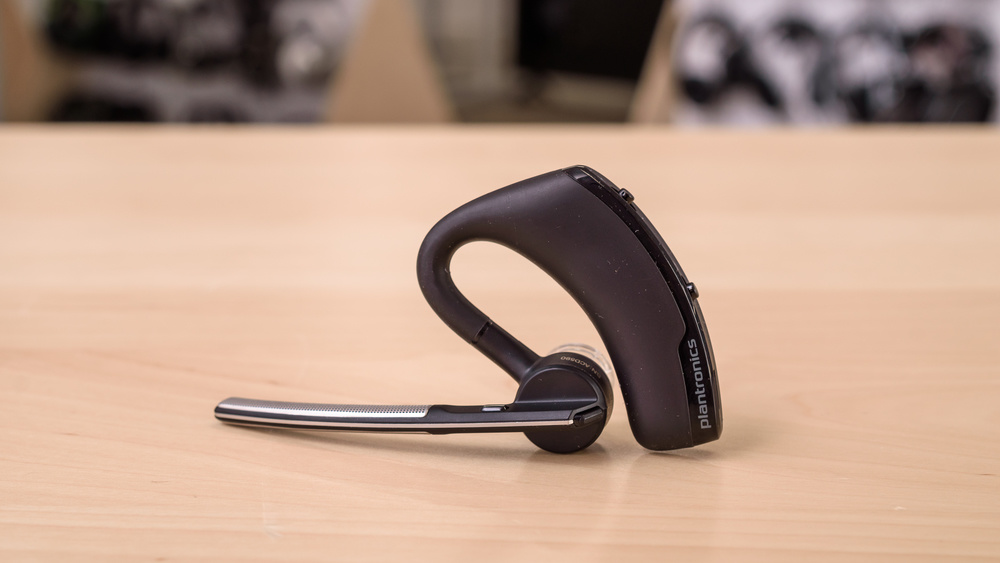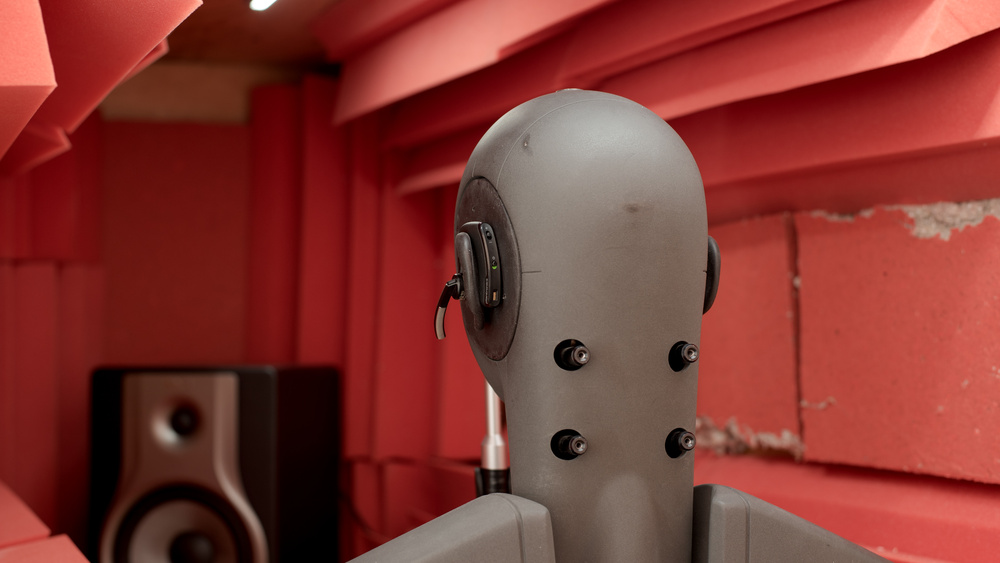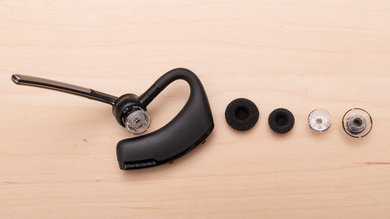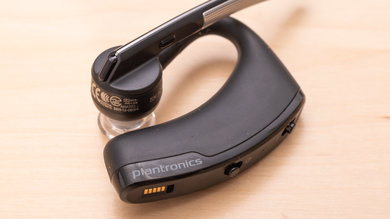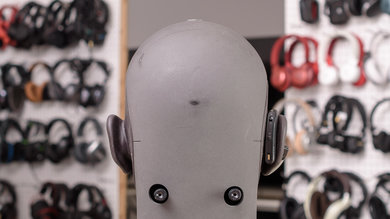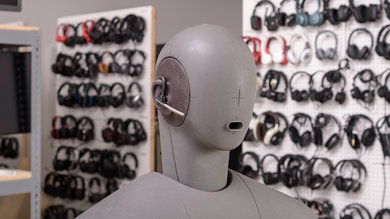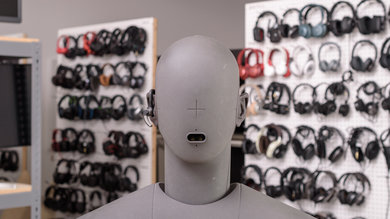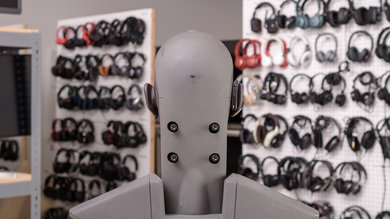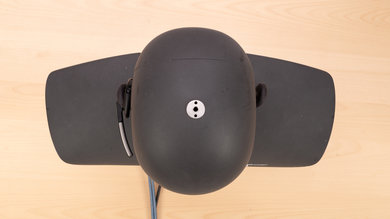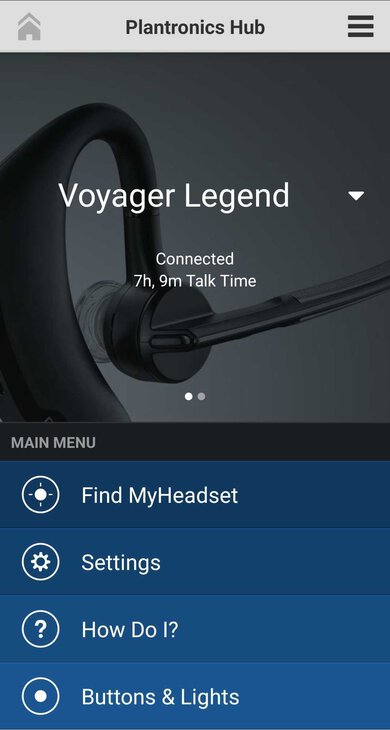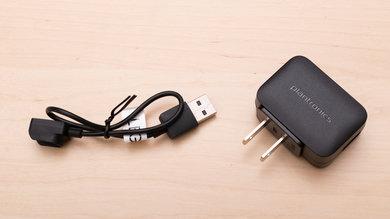The Plantronics Voyager Legend is a poor mono Bluetooth headset for phone calls. It's comfortable, has a good app with many customization options, and lasts nearly eight hours off a single charge, which should easily get you through a full workday. Unfortunately, its overall microphone performance is very disappointing, and while on phone calls, your voice sounds unnatural, thin, and lacking in detail. Unlike the Plantronics Voyager 5200 Bluetooth Headset, which has excellent noise handling, the Voyager Legend's mic has a tough time separating your voice in louder environments, and your voice may get lost completely.
Our Verdict
The Plantronics Voyager Legend is a sub-par mono Bluetooth headset for mixed usage. It's designed primarily for phone calls and isn't a good choice for listening to music due to its single-bud design and very un-balanced sound profile with practically no bass. Its Bluetooth-only connectivity and poor overall mic performance also make it a bad choice for gaming. On the bright side, it's comfortable enough to wear for long periods and lasts nearly eight hours off a single charge, making it somewhat suitable for taking phone calls in the office.
-
Comfortable fit that can be used on either ear.
-
Very stable design.
-
Good app with tons of customization options for phone calls.
-
Disappointing microphone recording quality.
-
Microphone has difficult time separating speech from background noise.
-
Sound profile is slightly shrill and piercing with some voices.
The Plantronics Voyager Legend isn't designed for listening to music. It's a mono headset with a very unbalanced sound profile that's severely lacking in bass.
The Plantronics Voyager Legend is sub-par for commuting or travel. It can be helpful if you make many phone calls while traveling or commuting, but it isn't the best choice due to its disappointing mic performance. It also blocks out practically no background noise, though this is by design, so you can hear yourself while speaking on the phone.
The Plantronics Voyager Legend is a great choice for sports and fitness. Because of its ear-hook design, it feels very stable and shouldn't fall off during strenuous workouts. It blocks practically no background noise, which is great if you run outdoor and like to stay aware of your surroundings. If you like to make phone calls while jogging, it can be a good choice. Unfortunately, it has poor overall microphone performance.
The Plantronics Voyager Legend is a disappointing choice for use in the office. It leaks a fair amount of audio, so your coworkers will likely hear whoever you're speaking to. It also blocks no background noise by design and has a disappointing overall microphone performance. On the bright side, its 7.8-hour battery should last you through an entire workday of phone calls, and it has a standby feature to help conserve the battery even more.
The Plantronics Voyager Legend isn't recommended for wireless gaming. Since it's Bluetooth-only, you can't connect it to any modern console, and when connected to a Bluetooth-enabled PC, its high latency and poor microphone performance is less than ideal.
The Plantronics Voyager Legend is a Bluetooth-only headset, and you can't use it wired.
The Plantronics Voyager Legend is a bad Bluetooth headset for phone calls. It's comfortable enough to wear for extended periods, has a ton of customization options, feels very stable in the ear, and lasts nearly eight hours off a single charge, which is good. Unfortunately, when using the microphone, your voice sounds unnatural, thin, and difficult to understand. Its boom microphone also has a hard time separating your voice from background noise, so even in moderately noisy environments, it's difficult to hear you. Finally, while the sound profile is extremely well-balanced in the mid-range, where most vocals sit, some higher-pitched voices sound shrill and painful.
- 6.0 Mixed Usage
- 5.7 Neutral Sound
- 5.6 Commute/Travel
- 8.0 Sports/Fitness
- 5.4 Office
- 5.1 Wireless Gaming
- 4.9 Wired Gaming
- 4.8 Phone Calls
Changelog
- Updated May 21, 2020: Review published.
- Updated May 15, 2020: Early access published.
- Updated May 13, 2020: Our testers have started testing this product.
- Updated May 13, 2020: The product has arrived in our lab, and our testers will start evaluating it soon.
- Updated Oct 07, 2019: We've purchased the product and are waiting for it to arrive in our lab.
Check Price
Compared To Other Headphones
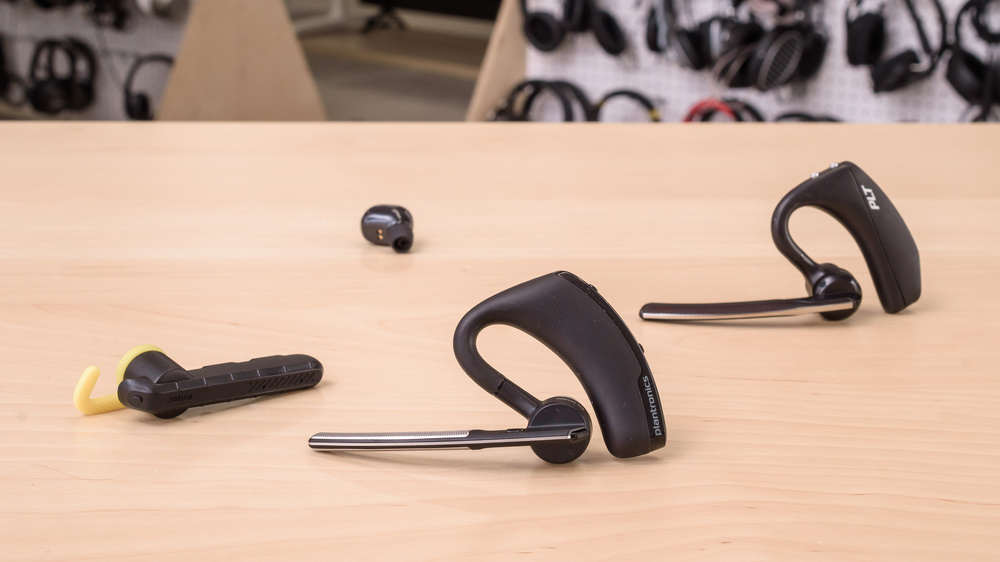
The Plantronics Voyager Legend is a bad mono Bluetooth headset that doesn't perform nearly as well for phone calls as the newer Plantronics Voyager 5200 Bluetooth Headset. While both have almost identical designs, the microphone on the Voyager Legend performs much worse overall. The recording quality of the mic is noticeably lower, and it does a much worse job at handling background noise.
Check out our recommendations for the best Bluetooth headsets for phone calls, or if you want something better-suited for gaming, the best wireless gaming headsets.
The Plantronics Voyager Legend Bluetooth Headset is a much worse mono headset for phone calls than the Plantronics Voyager 5200 Bluetooth Headset. Both headsets share almost the same design and feel equally comfortable, well-built, and stable, except the 5200 charges via Micro-USB while the Legend uses a proprietary magnetic charging clip. The 5200 has a better-balanced sound profile for phone calls, resulting in less piercing and painful voices. It also has a much better microphone that makes your voice sound slightly more natural and does a significantly better job of separating your voice from background noises. On the other hand, the Voyager Legend has longer battery life.
The Jabra Talk 45 Bluetooth Headset is better for phone calls than the Plantronics Voyager Legend Bluetooth Headset. The Plantronics is more comfortable, better-built, and it has more controls. However, it leaks a lot more noise than the Jabra. The Jabra's boom microphone also has a better recording quality and noise handling performance, so it makes your voice clearer to whoever's on the other end of the line.
The BlueParrott B450-XT Headset is a better headset for making phone calls than the Plantronics Voyager Legend Bluetooth Headset. The BlueParrott has a more balanced sound profile and its boom microphone has a significantly better overall performance. Its continuous battery life is longer, it has NFC pairing, and its latency across PC, iOS, and Android is lower too, although some apps and devices seem to compensate for lag differently. However, the Plantronics is significantly more comfortable. As it's a mono in-ear, it's more portable and stable.
While the Astro A40 TR Headset + MixAmp Pro 2017 and the Plantronics Voyager Legend Bluetooth Headset both have a boom mic and have a focus on speech, they're designed for different uses. The Astro is a better choice if you want a gaming headset that will deliver more immersive stereo sound while you play your games and can easily be plugged into your gaming console. On the other hand, the Voyager Legend is a Bluetooth Headset that's designed for making phone calls from a mobile device, and its mono earbud won't help pull you into a game like the Astro. It's also Bluetooth-only, so it won't work with PS4 or Xbox One.
The Jabra Steel Bluetooth Headset is slightly better for phone calls than the Plantronics Voyager Legend Bluetooth Headset. The Jabra leaks much less audio, has a significantly better recording quality, and does a better job at separating your voice from background noises. On the other hand, the Plantronics is more comfortable, has better controls, looks and feels more premium, has a better-balanced sound profile for phone calls, lasts longer off a single charge, and has a much better app with a ton of customization options.
The Mpow EM12 Wireless Earphone is a better mono headset for phone calls than the Plantronics Voyager Legend Bluetooth Headset. The Mpow's microphone has a better recording quality, and the headset leaks much less audio. On the other hand, the Plantronics is more comfortable, has much better controls, a significantly longer battery, and a dedicated companion app with many customization options.
The TaoTronics SoundLiberty 79 Truly Wireless and the Plantronics Voyager Legend Bluetooth Headset are wireless earbuds designed for very different uses. While the TaoTronics are truly wireless in-ears with a well-balanced sound profile designed for listening to music, the Plantronics is a mono Bluetooth headset for making phone calls while in the office or driving. Since the TaoTronics has a built-in microphone, it can be used for phone calls as well, but isn't designed for this, and the microphone on the Voyager performs much better.
The Plantronics Voyager Legend Bluetooth Headset is better for phone calls than the Plantronics Voyager 3200 Bluetooth Headset. The Legend has a more comfortable and stable fit and is also better-built. However, the 3200 has a better-balanced treble range, so voices and sibilants sound more clear and detailed.
Test Results
The Plantronics Voyager Legend looks almost identical to the Plantronics Voyager 5200 Bluetooth Headset. Both headsets are primarily matte black, but the Legend's thin boom microphone is almost entirely silver. It has a very straightforward and professional look.
The Plantronics Voyager Legend is quite comfortable. Its fit and design are identical to the Plantronics Voyager 5200 Bluetooth Headset, and it comes with three sizes of silicone tips, which don't enter deeply into the ear canal. It also comes with two sizes of cloth covers for the earbuds, which may be more comfortable for some people. While the ear-hook is flexible and doesn't put too much pressure on your ear, it may start to cause some slight fatigue or discomfort after a couple of hours. Luckily, you can easily swivel the mic around and switch ears throughout the day to reduce discomfort.
The controls of this headset are decent overall and are almost identical to the Plantronics Voyager 5200 Bluetooth Headset, except that the volume buttons are in a slightly different place. The buttons are designed for call controls and give you a good amount of options, including the ability to trigger your phone's voice assistant.
This headset is very portable. It can fold into a compact position and should be able to fit into most pockets. If you want something even more portable, check out the Mpow EM12 Wireless Earphone.
This headset doesn't come with a carrying case, though you can purchase a charging case separately.
The Plantronics Voyager Legend's build quality is good. It looks and feels almost identical to the Plantronics Voyager 5200 Bluetooth Headset and should be able to withstand a few accidental drops and bumps without sustaining too much damage. The ear-hook is flexible, and the headset looks fairly premium overall.
The Plantronics Voyager Legend feels very stable thanks to its ear-hook design. Unlike the Plantronics Voyager 3200 Bluetooth Headset, it stays in place during moderately intense workouts, which is good if you make phone calls while jogging.
The Plantronics Voyager Legend's sound profile isn't the most balanced and accurate, but it's fairly well-tuned for voices and speech. It's very lacking in bass, but most voices sound present, clear, and detailed. Unfortunately, some higher-pitched voices may be slightly harsh and piercing.
The frequency response consistency is great. Provided you achieve a proper fit with the included tips, you should experience similar bass and treble response every time you use it.
The bass accuracy is terrible. There's practically no low-bass or mid-bass, meaning music will have no thump, rumble, or punch. That said, as this headset is designed for phone calls and not listening to music, it shouldn't be too noticeable, especially since high-bass, which is responsible for giving low-frequency voices warmth, is less recessed than the rest of the ranges.
The Plantronics Voyager Legend's mid accuracy is superb. The entire range is very well-balanced and accurate, without much over or under-emphasis. Since this range is where most voices sit, this results in clear and full voices that don't sound honky, thin, or weak.
The Plantronics Voyager Legend's treble accuracy is sub-par. Unlike the Plantronics Voyager 5200 Bluetooth Headset, which has very well-balanced low-treble, this range is quite over-emphasized on the Voyager Legend. Unfortunately, this will make some higher-pitched voices sound shrill and harsh. The rest of the ranges are uneven as well. Some mid-treble sounds are dull and lispy, while others sound piercing and painful. The majority of high-treble is very recessed, which causes some sounds to be closed-up and lifeless, though most voices don't reach these higher frequencies.
The peaks and dips performance is sub-par. The large peak across high-bass and low-mid causes lower-frequency voices to appear boomy and muddy concerning the very recessed low-bass range. The dip in mid-treble that falls between the peak in low-treble and the mid to high-treble makes some higher-frequencies sound sharp and piercing, while others will be dull and lifeless. Overall, while the entire sound profile is uneven, this is most noticeable with music and won't be as noticeable during phone calls, except for the peak in low-treble, which may cause some parts of speech to be sharp and piercing.
Because this headset is mono, there's no stereo imaging.
Like with most in-ears, the passive soundstage of this headset is poor. This is because properly activating the resonances of the pinna (the outer ear) is one of the important factors in creating an out-of-head and speaker-like soundstage. Since in-ears and earbuds completely bypass the pinna, their soundstage tends to be perceived as small and located inside the listener's head. Because of the earbud design that doesn't enter your ear canal as deep as in-ears, audio sounds very open.
This headset doesn't have any virtual soundstage features.
The weighted harmonic distortion is decent. While there's some distortion present, it likely won't be too noticeable for most people while on phone calls.
These are the settings used to test this headset. Our results are only valid when listening using these settings.
This headset isolates practically no background noise. This is likely by design, as while on phone calls, it helps to hear your voice when speaking. This is also because the earbud rests inside the ear as opposed to going deep into the ear canal like typical in-ear headphones.
The Plantronics Voyager Legend's leakage performance is only okay. Unfortunately, it leaks a bit more audio than the Plantronics Voyager 5200 Bluetooth Headset, and if you work in an open office, coworkers nearby will likely hear the person you're speaking to.
This headset has a boom microphone that can swivel, meaning you can use the headset in either ear.
The recording quality of the Plantronics Voyager Legend's microphone is poor. It's worse than the Plantronics Voyager 5200 Bluetooth Headset, the Jabra Talk 45 Bluetooth Headset, or the Jabra Steel Bluetooth Headset, and your voice sounds distorted, unnatural, and thin.
The microphone's noise handling is sub-par. Even in only moderately noisy environments, the person you're speaking to will have a hard time hearing you. On the bright side, unlike headphones with an integrated mic, the boom microphone prevents your voice from getting completely drowned out. If you want a Bluetooth headset with better noise handling, check out the Plantronics Voyager 5200 Bluetooth Headset or the BlueParrott B450-XT Headset.
The Plantronics Voyager Legend's overall battery performance is mediocre. It lasts nearly eight hours off a single charge, which should be more than long enough to get you through an entire work day's worth of phone calls. It also has a standby mode to help conserve battery life between calls. Unfortunately, it uses a proprietary magnetic charging cable, which is a pain if you forget or misplace it.
The dedicated companion app is good. While it includes all the same functionality as the one for the Plantronics Voyager 5200 Bluetooth Headset, the Voyager Legend doesn't support 'Tile' to track the headset in case you misplace it. Other than that, it gives you a ton of customization options specific to phone calls like the ability to configure the sensors in the headset to automatically answer or reject a phone call while you're wearing the headset.
The Plantronics Voyager Legend is a Bluetooth 3.0 headset that supports multi-device pairing so you can easily switch between your PC and phone, which is convenient. Likely because this headset uses a much older version of Bluetooth, it has high latency on all devices while watching YouTube videos. It's worth noting that apps seem to compensate for this differently, so your mileage may vary.
The Plantronics Voyager Legend is a Bluetooth-only headset.
This headset is Bluetooth-only and isn't compatible with PS4. It should work with any Bluetooth-enabled PC.
Comments
Plantronics Voyager Legend Bluetooth Headset: Main Discussion
Let us know why you want us to review the product here, or encourage others to vote for this product.
Update: Updated the text for relevance and clarity and made sure the products are in stock.
What do you think of these changes? Let us know
